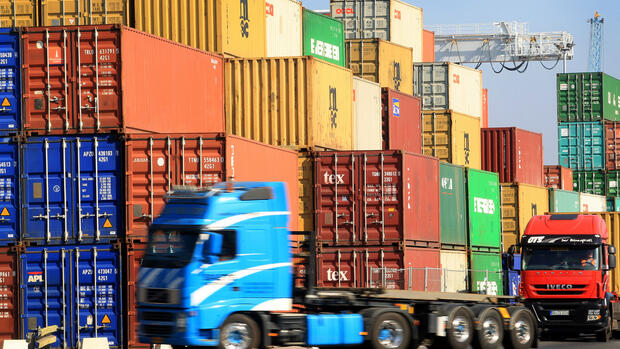For 2024, the Ministry of Economic Affairs is currently assuming growth of 1.6 percent.
(Photo: dpa)
Berlin Federal Minister of Economics Robert Habeck (Greens) plans to raise the economic forecast for the German economy. In 2023, gross domestic product (GDP) is expected to grow by 0.4 percent. This emerges from the new economic projection of the federal government, as the Handelsblatt learned from government circles.
Next Wednesday, Habeck will present the forecast, which was first reported by the Reuters news agency. It forms the basis for the new tax estimate in May.
The government would therefore expect growth to be twice as high as in January. For 2024, the Ministry of Economic Affairs is currently assuming growth of 1.6 percent. This is slightly less than the previous forecast in January.
These are still preliminary figures from the Federal Ministry of Economics. The forecast is currently being coordinated with the Ministry of Finance, among others, and can still change until Wednesday.
The Ifo Institute will publish its important business climate index on Monday. The leading indicator could still lead to a revision of the numbers if the results are surprising.
But one thing is clear: the German government will not forecast a contraction in the German economy in 2023. Some economic researchers had forecast this in recent months. However, the majority is now assuming an increase, albeit only a slight one.
The four leading economic research institutes had assumed growth of 0.3 percent in their joint forecast two weeks ago. The Ministry of Economics uses the institute’s forecast as the basis for its own forecast – this time there is apparently quite a consensus.
The German economy is thus still in lean times. The energy crisis is still having an impact. Consumption by private consumers is improving only slowly, companies from energy-intensive sectors are still having to digest the sharp rise in gas and electricity prices over the past year. In the fourth quarter of 2022, the German economy shrank.
Hope value 1: price declines
But meanwhile things are slowly picking up again, and Germany should currently be growing slightly. The better prospects for the current year are mainly due to the increasing easing in prices. Energy prices have fallen significantly since the summer of 2022, and this is now increasingly being felt by companies and consumers.
Definition: What is a recession?
According to the preliminary figures, the Ministry of Economic Affairs is assuming an inflation rate of 5.9 percent for 2023, and it is expected to fall to 2.7 percent in 2024. In January, the government had expected both inflation rates to be 0.1 percentage points higher.
>> Read here: The German economy did not come through the double crisis well – and there is no improvement in sight
Recently there have been increasing signs that the easing of prices is progressing. After inflation rates of 8.7 percent in January and February, the rate in March was 7.4 percent.
Another drop is likely, as indicated by one of the most important leading indicators of inflation. Producer prices fell by 2.6 percent in March compared to the previous month. This is mainly due to cheaper gas, oil and electricity: Energy prices fell by 7.6 percent in March.
Hope value 2: China
Further positive economic impulses for Germany come from China. After the end of the strict zero-Covid policy, the Chinese economy grew faster than economists had expected. In the first quarter of 2023, the People’s Republic’s GDP rose by 4.5 percent year-on-year. Analysts had only expected an increase of four percent. The German economy, which is heavily dependent on foreign trade, could particularly benefit from this.
Habeck wants to officially present the spring projection next week in Berlin.
(Photo: IMAGO/Future Image)
China is Germany’s most important trading partner. In February, exports to the People’s Republic rose 10.2 percent month-on-month, while imports increased by 4 percent overall.
Hope value 3: labor market
In addition, the German labor market continues to be robust; This emerges from the preliminary figures of the German government’s economic forecast. The unemployment rate is expected to rise slightly this year, from 5.3 percent last year to 5.4 percent this year. A decline to 5.2 percent is then forecast for 2024.
>> Read here: Germany has to get used to modest economic growth: a comment
Wages are also increasing, compensating for increasing parts of the loss of purchasing power caused by inflation. That supports consumption.
More: Leading institutes warn against planned energy subsidies
